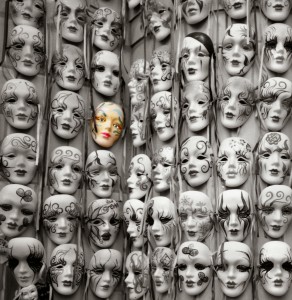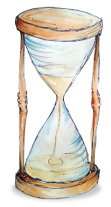 Today, I discovered a new word: Maskenfreiheit, the freedom conferred by masks. Apparently, John Updike was a fan, relishing the ability to obtain some semblance of anonymity by hiding behind his characters: you can’t be blamed for the actions of a character you’ve created. True enough – though in the case of the writer, I suspect it’s not entirely true. Who can help but read autobiographical detail into even the most removed creation? And who, knowing the writer, can resist the egotistical impulse to take personally something that was likely not meant for him (though, of course, it might have been–and that ambiguity invites even further speculation)?
Today, I discovered a new word: Maskenfreiheit, the freedom conferred by masks. Apparently, John Updike was a fan, relishing the ability to obtain some semblance of anonymity by hiding behind his characters: you can’t be blamed for the actions of a character you’ve created. True enough – though in the case of the writer, I suspect it’s not entirely true. Who can help but read autobiographical detail into even the most removed creation? And who, knowing the writer, can resist the egotistical impulse to take personally something that was likely not meant for him (though, of course, it might have been–and that ambiguity invites even further speculation)?
Writers aside, I think Maskenfreiheit speaks to an incredibly powerful phenomenon that has long captivated me — and frightened me to no end. Up until now, I just didn’t realize there was a word to describe it. Maskenfreiheit captures why I am so afraid of carnivals, of masked balls (not that I am invited to many), of clowns. When you, in effect, erase your face, you erase some inner sense of responsibility. You can try on actions that the real-life you would never dare. You can become the owner of any face you choose. (And, of course, there’s the flip side: you can shed any face you choose.) Masks can be liberating, an opening to experimentation you would feel too self-conscious or constrained to attempt otherwise. They can have a dark side, an invitation to indulge your inner Mr. Hyde, so to speak. And even if at first, your Hyde isn’t all that evil, repeat experimentation may prove intoxicating. Masks can be addictive.
There is an eeriness to the mask, to the face that you can’t decipher or discern. An emptiness.
The perception of anonymity does strange things to people. It’s why so many websites ban anonymous commenting: if you don’t have to add a name to an opinion, you are free to endorse those opinions your “real” self would shy away from. You can be mean or spiteful or arrogant or whatever else you choose. Of course, there is the counter argument of freedom: you can say things you would otherwise be too afraid to express for fear of personal repercussions. Online or off, masks are the ultimate liberation and temptation, all in one.
And in that way, masks can actually reveal us as we really are more so than almost anything else. How do we behave when we are freed of social constraints? When we shed the responsibility of name and face and blend into the anonymous, the crowd, the faceless masses? How do we use our Maskenfreiheit? A thought exercise: what would you do, say, create if you knew with complete certainty it would never come back to you?
I can’t help but quote Sherlock Holmes here. His words are too à propos:
The pressure of public opinion can do in the town what the law cannot accomplish. There is no lane so vile that the scream of a tortured child, or the thud of a drunkard’s blow, does not beget sympathy and indignation among the neighbours, and then the whole machinery of justice is ever so close that a word of complaint can set it going, and there is but a step between the crime and the dock. But look at those lonely houses, each in its own fields, filled for the most part with poor ignorant folk who know little of the law. Think of the deeds of hellish cruelty, the hidden wickedness which may go on, year in, year out, in such places, and none the wiser.
Holmes will take the lowest and viles alleys of London over the smiling and beautiful countryside any day. And I have to say, I can’t help but agree with the sentiment.
***
Can a writer ever be anonymous? How much Maskenfreiheit can he ever really have? In some ways, writing is the least anonymous thing you can do. The more you hide, the more you reveal. Every choice says something. Even the pseudonym. It reminds me of Nabokov’s Pale Fire: layer upon layer of identity, until you’re not quite sure what is what. That old clichéd image of the peeling onion—only you don’t know which layer you’re holding and if it’s even an onion to begin with.
Writing is a mask, it’s true. But it seems to me a deceptive one. An illusion of anonymity. Then again–perhaps that is why it is, in the end, the perfect mask. As writers, we reveal, we hide, we dissemble, we direct, we clarify, we entangle. And ultimately, who’s to say what is really what, where one finishes and another begins? Apart from the guesses, what remains?
Image credit: Brian Snelson, Creative Commons.



5 Comments
The German Language does have some very interesting words, and have enriched the English Language immeasurably since is absorbs words from different languages effortlessly. I ran across one such word while reading Aleksandr Solzhenitsyn’s book “August 1914” many many years ago – “Schadenfreude” – which means “To take pleasure in other peoples misfortune”. In the book it was used to describe the Russian women lining the balconies and looking down with silent ‘Schadenfreude’ at the remains of the defeated German army as they retreated from the advancing Russian armies. The Wikipedia defines it as “Schadenfreude Listeni/ˈʃɑːdənfrɔɪdə/ (German: [ˈʃaːdənˌfʁɔʏdə]) is pleasure derived from the misfortunes of others.[1] This German word is used as a loanword in English and some other languages”
But thanks for the word – a metaphor I think, “Maskenfreiheit”. It allows me to define my expressions behind the mask I wear when I communicate with people I don’t care for, and when I will now go on and wear the Venetian Mask we bought from Venice last year and will think of something and then whip off the mask and study my expression which were behind the mask as I thought of certain events … Smiles sent for you here, Maria – and no Mask!
Very interesting. This made me think of 2 different masks that I see here in Los Angeles (though not exculsively)
1. People who have had lots of “face work”. I wonder if there isn’t some maskenfreiheit at work there. Though many of us mock the fakeness of the extreme plastic surgery look, is it possible that some people enjoy hiding behind an expressionless forehead and a permanent smile?
2. In the Asian community there are these full-face covers that look sort of like welder’s helmets that I believe are worn to protect the face from sun damage. In my opinion, people that I see wearing these covers always seem to walk taller, and more proud, as if it were a crown or diamond tiara. Maybe it’s a cultural thing, but I would run and hide if I was forced to wear one.
Both interesting points. I’ve never thought about face work in that light, but it strikes me as quite plausible. Certainly something to think about. There have actually been studies that show that botox changes a person’s emotional range, so I wouldn’t be surprised to see even wider repercussions for more extensive plastic surgery.
“The perception of anonymity does strange things to people. It’s why so many websites ban anonymous commenting: if you don’t have to add a name to an opinion, you are free to endorse those opinions your “real” self would shy away from. You can be mean or spiteful or arrogant or whatever else you choose. Of course, there is the counter argument of freedom: you can say things you would otherwise be too afraid to express for fear of personal repercussions. Online or off, masks are the ultimate liberation and temptation, all in one.”
I would also add that a person who has no self confidence can have confidence when writing anonymously. Perhaps there is a deep philosophical issue here that when we let go of ourselves we gain in confidence? What do you think? Perhaps, if there is no ‘self’ to which the characteristic ‘confidence’ can be ascribed, the notion of confidence is in a sense thrown by the wayside. Is the whole notion of confidence less applicable to someone who has blurred their identity through anonymity?
I always thought that communicating anonymously was a more pure form of communication. All the social barriers typically present in communication are destroyed and anonymous dialogue becomes an interaction based on pure ideas.
When people type anonymously to each other the constraints of titles, wealth, physical attractiveness, body language, and social status are all thrown by the wayside and only the persons ideas remain. In this way, typing anonymously to one another is the most open and honest form of communication. Yes there is some alleviation of responsibility as one can for example safely make racist attacks and promote Nazi ideology, but do the benefits of pure idea-based dialogue not outweigh these possible risks?
I think that’s certainly a valid point. Something that could be tested empirically, too, I think. I’m not sure if the research has been done, but if not, it would be worthwhile to pursue!
[…] Uncategorized On wearing masks […]
One Trackback
[…] Uncategorized On wearing masks […]